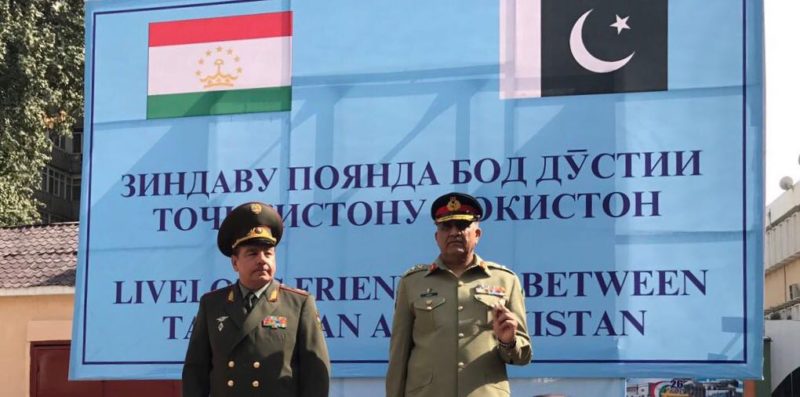Dushanbe, Tajikistan: The two-day Quadrilateral Counter Terrorism Coordination (QCTC) Forum will review will review regional security and organizational and functional design of “quartet”.
This will be the first technical meeting after the announcement and formation of QCTC in Urumqi, China last August. It may be mentioned that the official name of Forum was proposed as Quadrilateral Cooperation and Coordination Mechanism (QCCM) on August 3, 2017 in Urumqi.
Military delegations from China, Pakistan and Afghanistan have arrived to discuss mechanism to counter terrorism in the region.
Pakistan is pro-active partner of the Forum as she has high stakes in the region being the country of the flagship project of Chinese project “One Belt One Road”. China Pakistan Economic Corridor (CPEC) is design to link China with Gwader Port of Pakistan for catering cargo traffic of Central Asia and Southern China.
According to tentative agenda, participants in the quadripartite group will discuss points including exchange of information, building the capacity to combat terrorism, conducting joint anti-terrorist exercises and educational seminars, making collective decisions on counter-terrorism strategy.
Micro-level agenda of forum is how to establish a barrier to terrorism and extremism in the region, to prevent the emergence of new terrorist and extremist groups, and to restore the region to security and stability, primarily in countries such as Afghanistan and Pakistan.
The largest cultural and linguistic proximity within the framework of the coalition is Tajikistan and Afghanistan, which, among other things, have a common border of about 1,400 km. The national security of the Republic of Tajikistan is closely tied to the security and stability of the member states of alliance, especially Afghanistan. The penetration of individual militant detachments into Tajikistan is a big concern to Dushanbe as Afghan Taliban are strengthening in the Kunduz area. Tajik authorities believe that the danger of a Taliban and Islamic State (Daish) militants clash near Tajik border and militants attempt to enter into Tajik border is increasing.
Another common threat to the security of Tajikistan and Afghanistan is presence of foreign terrorists near Tajik border. In recent years, many statements have been made public about the participation of groups of Tajik and Afghan militants in the ranks of “Daish” (“Islamic State”. The strong presence of Daish in Afghanistan is a constant risk for Central Asia and as far as Russia because Daish hires terrorists of different nationalities including Arabs, Uzbeks, Tajiks as well as youth from the North Caucasus.
Experts believe that Dushanbe will use the quadrilateral coalition as an opportunity to strengthen security in the region, which is also in the interests of both Russia and China.
According to some experts, the four participating states have not only various military, economic and political opportunities, but also serious differences in interests, which in the past often led to periods of tension and bilateral differences. It should be noted that China is the main beneficiary of the new coalition, which pursues a variety of goals. During the talks in Urumqi last year, representatives of all four sides emphasized that the regional anti-terrorist quartet is not directed against any other country or international structure. However, it is not accidental that the anti-terrorist “group of four” was created in conditions when the activities of another quadripartite group with a similar composition, but also with the participation of the United States proved to be a failure.
This year Forum will decide organizational and functional design of “quartet”. Experts believe that design of “quartet” will be very similar to the Collective Security Treaty Organization (CSTO) with only difference Moscow plays the leading role in the SCTO while Beijing will take the lead in the new regional counter-terrorism structure.
Islamabad Adds:
Inter Service Public Relations (ISPR) of Pakistan Armed forces released following statement here at Sunday evening:
Meeting of Quadrilateral Counter Terrorism Coordination Mechanism (QCCM) held at Dushanbe, Tajikistan today. The meeting was attended by senior military leadership of member countries i.e. Chief of Army Staff (COAS) General Qamar Javed Bajwa Pakistan, Gen Li Zuocheng China, General Sobirzoda Imomali Abdurrahim Tajikistan and General Sharif Yaftali Afghanistan.
All four leaders welcomed the QCCM initiative and expressed hope that an inclusive and cooperative regional approach will prove best for eradication of terrorism.
Speaking on the occasion, General Qamar Javed Bajwa highlighted achievements of Pakistan in fight against terrorism for eliminating terrorists’ safe havens from its soil. He said that terrorism being a transnational threat can only be defeated through intelligence sharing and coordinated effective border management.
The participants also signed an outline cooperative mechanism which will come into force after its endorsement by respective governments.
On sidelines of the event, COAS met Afghan CGS Gen Sharif Yaftali. Afghan situation was discussed candidly sharing concerns.
COAS while assuring fullest cooperation to Afghanistan said that Pakistan cannot bring Afghan war into Pakistan.
COAS said that Pakistan has already cleared all its areas indiscriminately and has started unilateral border security measures including fencing. Besides border security management other key factor for enduring peace is dignified repatriation of Afghan Refugees.
COAS reassured Afghan side that Pakistan is open to any suggestion that facilitate peace in Afghanistan. In this spirit, he offered to form a Pak- Afg Army working group to jointly work and formulate security recommendations for government level discussion aimed at addressing mutual concerns. Afgan CGS agreed to the proposal and thanked COAS for his relentless efforts towards peace.

Upon arrival, COAS called on the Tajik Defence Minister Mr Sherdil Mirzo and Chinese Chief of Joint Staff, General Li Zuocheng.
During the next two days the forum shall discuss regional security environment and way forward in relation to situation in Afghanistan and Counter Terrorism efforts.
